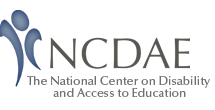NCDAE Webcast - Designing Web Content that is Accessible To Users With Cognitive Disabilities
Thank you for tuning into the May 7th webcast.
Overview
This webcast provided information on cognitive accessibility research conducted by NCDAE and others, overviewed the most common web accessibility issues for users with cognitive and learning disabilities, and provided strategies for designing to this audience.
The webcast featured Clayton Lewis from the Coleman Institute for Cognitive Disabilities at University of Colorado, Gregg C. Vanderheiden from the Trace R&D Center at the University of
Wisconsin-Madison, and Jared Smith from WebAIM and was moderated by Cyndi Rowland.
Archives
The archives for the audio broadcast from Wed, May, 2004, entitled Research and Development of Accessible Technologies are available below.
Panelists
Clayton Lewis
Lewis is Professor of Computer Science, and Fellow of the Institute of Cognitive Science, at the University of Colorado, Boulder, where he has been based since 1984. He is well known for his research on evaluation methods in user interface design. Two methods to which he and his colleagues have contributed, the thinking aloud method and the cognitive walkthrough, are in regular use in software development organizations around the world. He has also contributed to programming language design, to educational technology, and to cognitive theory in causal attribution and learning. He has twice served as Technical Program Chair or Co-chair for the ACM CHI Conferences on Human Factors in Computing Systems, the leading international conference in that field, and serves on the editorial boards for Human-Computer Interaction and Cognitive Science.
Prior to joining the University of Colorado, Lewis was Manager of Human Factors at IBM's Watson Research Center. He has held visiting positions at the Center for Advanced Decision Support in Water and Environmental Systems (at the University of Colorado), at the University of Vienna, at the National Center for Geographic Information and Analysis (University of Maine), at the Knowledge Media Institute at the Open University in Milton Keynes, England, and at IBM's Printing Systems Division.
At the University of Colorado Lewis serves on the Advisory Board for the Alliance for Technology, Learning and Society, an interdisciplinary institute for education and research. He is also Scientist in Residence at the Coleman Institute for Cognitive Disabilities. He was named University of Colorado President's Teaching Scholar in 1989, a life title signifying the University's highest award for teaching. He served as Computer Science department chair from 1999 to 2003.
Lewis earned an AB in mathematics from Princeton University, an MS from MIT, for interdisciplinary study in mathematics and linguistics, and a PhD from the University of Michigan in experimental psychology. He has authored or co-authored more than 50 technical articles and has received more than $2.5M in research funding.
Gregg C. Vanderheiden
Gregg C. Vanderheiden, Ph.D., directs the Trace R&D Center at the University of Wisconsin-Madison, and is a professor in the Industrial and Biomedical Engineering Departments. The Trace Center is a federally funded center focused on increasing the usability of information and telecommunication products for the widest possible audiences.
Dr. Vanderheiden has been working in the area of access to technology for 36 years. He was a pioneer in the field of augmentative communication and assistive technology, developing one of the early electronic devices for persons who could not speak or write. He worked with the computer industry to develop and build disability access features directly into their standard products. Access features developed by Dr. Vanderheiden and the Trace Center team (e.g., StickyKeys, MouseKeys, etc.) have been included in the Macintosh OS since 1987, and in Microsoft Windows 95 through Vista.
Dr. Vanderheiden has developed techniques used to provide cross-disability access to a wide range of electronic products. These techniques have been implemented in systems as varied as the US Postal Service's Automated Postal Center, Amtrak Quik-Track ticket kiosks, Viking Door Entry system, Phoenix Airport Information and Paging System, and both WWII and Korean War Memorial information kiosks in Washington, D.C. Some of the techniques are also being applied to ATMs and cell phones.
Dr. Vanderheiden has provided leadership on a number of industry standards efforts. He is co-editor of the World Wide Web Consortium's Web Content Accessibility Guidelines, and co-chairs the WCAG Working Group. He is also Chair of the InterNational Committee for Information Technology Standards V2 Technical Group, which developed the universal remote console standards adopted by ANSI in 2005, and is editor of the ANSI/HFES 200.2 HCI Standards related to software accessibility.
Dr. Vanderheiden holds degrees in electrical engineering and biomedical engineering. He received his Ph.D. in Technology in Communication Rehabilitation and Child Development, an interdisciplinary degree between the departments of Electrical and Computer Engineering, Communicative Disorders, and Educational Psychology, University of Wisconsin-Madison. He founded the Trace Center in 1971.
Jared Smith
Jared Smith, M.S., is the Associate Director for WebAIM and an instructional designer, Web developer, and accessibility trainer. He specializes in training web developers, IT professionals, and educators in web accessibility principles and techniques. He has developed accessible course content, web multimedia, distance education tools, and database-driven web sites. Besides providing accessibility training as part of the WebAIM team, he also teaches courses in Macromedia Flash and multimedia development in the Instructional Technology Dept. at Utah State University. He has written a broad range of documents, tutorials, articles, and other materials, many of which are featured on the WebAIM site.
Cyndi Rowland
The discussion was moderated by Cyndi Rowland of the National Center on Disability and Access to Education.

